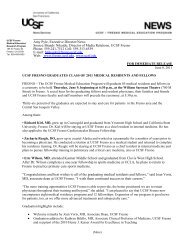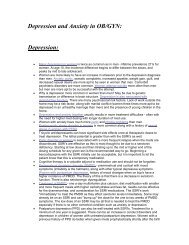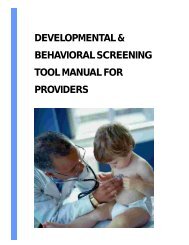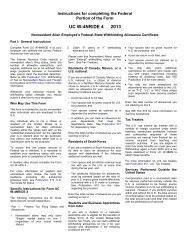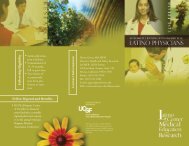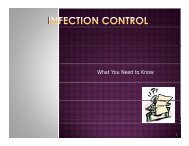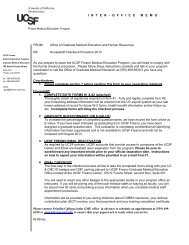Grievance/Due Process Policy - UCSF Fresno - University of ...
Grievance/Due Process Policy - UCSF Fresno - University of ...
Grievance/Due Process Policy - UCSF Fresno - University of ...
- No tags were found...
Create successful ePaper yourself
Turn your PDF publications into a flip-book with our unique Google optimized e-Paper software.
GMEC Approval Date: 11/20/2007Revised: 10/24/2007Superceded: 2/9/2007Next Revision Date: 11/20/2010POLICY:ACADEMIC DUE PROCESS AND LEAVE POLICYDIAGRAM OF REVIEW OPTIONS AND PROCESSI. INTRODUCTIONA. PREAMBLE AND PURPOSEB. DEFINITIONSII. ADMINISTRATIVE ACTIONS, NON-APPEALABLE ACADEMIC ACTIONS, AND ACTIONSAPPEALABLE TO THE DEPARTMENTA. ADMINISTRATIVE ACTIONS1. Automatic Suspension2. Automatic Resignation3. Leaves4. Reportable IncidentsB. NON-APPEALABLE ACADEMIC ACTIONS1. Counseling Letter2. Notice <strong>of</strong> ConcernC. ACADEMIC ACTIONS APPEALABLE TO THE DEPARTMENT1. Academic Probation2. Suspension3. Adverse Annual Evaluation4. Requirement That Trainee Must Repeat an Academic Year5. Denial <strong>of</strong> <strong>University</strong> Certificate <strong>of</strong> Completion6. Change <strong>of</strong> RecordD. DEPARTMENT CLINICAL COMPETENCE COMMITTEE APPEAL PROCEDURESIII. ACADEMIC ACTIONS APPEALABLE TO THE DEAN'S OFFICEA. GROUNDS FOR ACTION1. Non-Renewal <strong>of</strong> an Annual Contract2. Dismissal From GME Training ProgramB. NO DUPLICATE HEARINGSC. NOTICE OF REASONS FOR NON-RENEWAL OR DISMISSALD. NON-RENEWAL AND DISMISSAL PROCEDURES1. Level One - Informal Review2. Level Two - Formal ReviewE. APPEALF. REMEDY1
St. Patrick’s Day Notes: Next Thursday 3/17• STUDENT UNIFORM SHIRTS MAY GO GREEN – All students are permitted to change outtheir uniform shirts or blouses for a green shirt or blouse and green hair ribbons or bracelets (theseaccessories only). Parents please – green shirts are green, that is not multi-colored with green trim!Green T-shirts with lettering OK – regular uniform skirts, jumpers, blue pants still apply. If a childdoesn’t have a green shirt, please have him or hear wear the regular uniform.• NOTRE DAME GLEE CLUB – The good news: the very talented and popular Notre Dame GleeClub is in Greenville and will be performing at our home-base Prince <strong>of</strong> Peace Church, on St.Patty’s Day, next Thursday night. The bad news: the 750 $5-tickets are ALREADY SOLD OUT!But . . .• GREENVILLE DOWNTOWN ALIVE – Greenville’s Thursday Downtown Alive kicks <strong>of</strong>f its2011 season with music in downtown Greenville next Thursday from 5:30 to 9:00 PM. We’repleased to tell you that POPCS’s 2 nd grade dad and PTO Board Member Bill Rhodes and his bandGreen Vegas will be the entertainment! Drop by and say “hi!” Bill, can you play “Alive Alive-O”or “Too-Ra-Loo-Ra-Loo-Ra?” THAT’s an Irish lullaby!Another Great Shrove Tuesday!The parish sponsored another great Shrove Tuesday – a traditional pancake supper leading up to thebeginning <strong>of</strong> Lent with Ash Wednesday this week. Thanks to Mrs. Chandler for organization, our PTOfor crafts and “King’s Cake – Rolls” and all the volunteers who helped prepare the food including Mrs.Pennell in the kitchen who shared her yummy buttermilk pancake recipe. About 300 people were inattendance.POPCS 8 th GraderChristian Fernandez isassisted servingpancakes by pancakeaficionado MonsignorBroveyPOPCS students run in the pancake race – andyou can see how serious they are! Oneparticipant, you’ll note, is John.R. the crownedKing for the night after finding baby Jesus in theKings’ Rolls!POPCS 7 th GraderJames C. can’t getenough <strong>of</strong> homemadebuttermilkpancakes!2
I. INTRODUCTIONI.A. Preamble and PurposeGraduate medical education involves the development <strong>of</strong> pr<strong>of</strong>essional competencies in a medicalspecialty as set forth by the Accreditation Council for Graduate Medical Education (ACGME) and itsindividual Residency Review Committees. These pr<strong>of</strong>essional competencies include standards <strong>of</strong>conduct such as pr<strong>of</strong>essionalism, honesty, punctuality, attendance, timeliness, proper hygiene,compliance with all applicable ethical standards and <strong>UCSF</strong> <strong>Fresno</strong> policies and procedures, an ability towork cooperatively and collegially with staff and with other health care pr<strong>of</strong>essionals, and appropriateand pr<strong>of</strong>essional interactions with patients and their families.At the <strong>University</strong> <strong>of</strong> California San Francisco, <strong>Fresno</strong> (“<strong>UCSF</strong> <strong>Fresno</strong>”) the primary responsibility forremedial academic actions relating to resident physicians and other post-M.D. trainees (hereinafterreferred to as “Trainees”) and clinical training programs resides within the departments and the individualtraining programs. Therefore, academic and performance standards and methods <strong>of</strong> training andevaluation are to be determined by each department and/or program at the <strong>University</strong>. There may bevariances regarding these standards among the various departments and programs. In general, traineescan be disciplined for unacceptable conduct in a variety <strong>of</strong> categories including but not limited to:a. incompetence, dishonesty, inadequate knowledge or ability to perform pr<strong>of</strong>essional activities,complete assigned duties, and deliver proper medical careb. failure to improve performance in an identified areac. conduct that violates pr<strong>of</strong>essional and/or ethical standards and/or the law, including intellectualdishonesty or cheating in scientific or scholarly activitiesd. failure to fulfill any term <strong>of</strong> the employment contract or comply with rules or policies <strong>of</strong> thetraining program, university, or training sitee. disruptive behavior; forcible detention, threats <strong>of</strong> physical harm to, or harassment <strong>of</strong> anothermember <strong>of</strong> the <strong>UCSF</strong> <strong>Fresno</strong> communityf. unauthorized use <strong>of</strong> <strong>UCSF</strong> <strong>Fresno</strong> resources or facilities on a significant scale for personal,commercial, political or religious purposesTrainees and their supervisors are encouraged to discuss their concerns with one another and, if thereare any disputes or disagreements, Trainees and their supervisors should make efforts to resolve them.The action(s) taken should be the one(s) that in the pr<strong>of</strong>essional and/or academic judgment <strong>of</strong> theProgram Director best address the deficiencies and needs <strong>of</strong> the individual Trainee and/or the GMEtraining program. These actions are at the discretion <strong>of</strong> the department and <strong>UCSF</strong> <strong>Fresno</strong> and need notbe progressive. The department and/or <strong>UCSF</strong> <strong>Fresno</strong> may select those action(s) described below whichit deems appropriate.The procedures set forth below are designed to provide <strong>UCSF</strong> <strong>Fresno</strong> trainees an orderly means <strong>of</strong>resolving differences. These Guidelines apply to all <strong>University</strong>-sponsored programs <strong>of</strong> Graduate MedicalEducation (GME). These Guidelines shall be the exclusive remedy for appealing reviewable academicactions at <strong>UCSF</strong> <strong>Fresno</strong>. Deviation from these procedures that does not result in material prejudice tothe Trainee will not be grounds for invalidating the action taken. Some actions may require obligatorydisclosure by the Trainee, institution, or training program in response to external inquiries, includingthose <strong>of</strong> state licensing boards or health care institutions. Additional time in the GME training program orbeyond the expiration <strong>of</strong> the Trainee’s appointment may be required to meet the educational objectivesand certification requirements <strong>of</strong> the department or the specialty. The Trainee will be notified in writing <strong>of</strong>any requirements for additional time. Funding for additional time extending beyond the original period <strong>of</strong>appointment will be permitted only at the discretion <strong>of</strong> <strong>University</strong> and upon written confirmation by theProgram Director with concurrence <strong>of</strong> the Chief. Unless otherwise approved by the Program Director,academic credit will be given only for full participation in the regular program.A Trainee, as part <strong>of</strong> his or her GME training program, may have responsibilities in a hospital, otherclinical setting, or research area. All such appointments, either initial or continuing, are dependent uponthe Trainee maintaining good standing in a GME training program. Dismissal from a GME training3
program will result in the Trainee’s automatic dismissal from any and all related appointments such asmedical staff membership.The <strong>Grievance</strong> and Appeals Procedure flow diagram underscores that most actions are either nonappealable,or may be appealed to the Department Chief. Only non-renewal <strong>of</strong> appointment anddismissal from the training program are appealable to the Associate Dean’s <strong>of</strong>fice. The structure <strong>of</strong> thispolicy follows that <strong>of</strong> the diagram.I.B. DefinitionsAcademic Deficiency: The terms “Academic Deficiency” and “Deficiencies” mean unacceptableconduct or performance, in the pr<strong>of</strong>essional and/or academic judgment <strong>of</strong> the Program Director includingfailure to achieve adequate progress or maintain good standing in the GME training program, or achieveand/or maintain pr<strong>of</strong>essional standards <strong>of</strong> conduct as stated below.Associate Dean: The term “Associate Dean” refers to the Associate Dean for <strong>UCSF</strong> <strong>Fresno</strong> MedicalEducation or his/her designee.Chief: The term “Chief” means the Chief <strong>of</strong> the Trainee’s specialty or subspecialty department, orhis/her designee.Clinical Competence Committee: The term “Clinical Competence Committee” means a regularlyconstituted committee <strong>of</strong> the School <strong>of</strong> Medicine or department that reviews the academic performance<strong>of</strong> Trainees, or a committee <strong>of</strong> faculty members specially selected by the Committee for the purpose <strong>of</strong>reviewing the academic performance <strong>of</strong> Trainees.Competencies: The term “competencies” refers to the specific knowledge, skills, and attitudes thatresidents are required to demonstrate in six areas defined by the Accreditation Council for GraduateMedical Education (ACGME 1999):a. Patient Care that is compassionate, appropriate, and effective for the treatment <strong>of</strong> healthproblems and the promotion <strong>of</strong> healthb. Medical Knowledge about established and evolving biomedical, clinical, and cognate (e.g.epidemiological and social-behavioral) sciences and the application <strong>of</strong> this knowledge topatient carec. Practice-Based Learning and Improvement that involves investigation and evaluation <strong>of</strong>their own patient care, appraisal and assimilation <strong>of</strong> scientific evidence, and improvements inpatient cared. Interpersonal and Communication Skills that result in effective information exchange andteaming with patients, their families, and other health pr<strong>of</strong>essionalse. Pr<strong>of</strong>essionalism, as manifested through a commitment to carrying out pr<strong>of</strong>essionalresponsibilities, adherence to ethical principles, and sensitivity to a diverse patient populationf. Systems-Based Practice, as manifested by actions that demonstrate an awareness <strong>of</strong> andresponsiveness to the larger context and system <strong>of</strong> health care and the ability to effectivelycall on system resources to provide care that is <strong>of</strong> optimal valueDays: The term “days” means calendar days.Duty Hours: The term “duty hours” means all required and formal elective time in the residencyprogram, including (1) patient care activities that meet educational objectives, including time spent inpatient care, on inpatient call and time required for transferring the care <strong>of</strong> the patient; (2) patient careactivities necessary to acquire and maintain skills and to meet patient care demands; and (3) didacticactivities, such as conferences, grand rounds and one-on-one and group learning in clinical settings(ACGME 2002).Dismiss or Dismissal: For the purposes <strong>of</strong> Part III.A.2 <strong>of</strong> this <strong>Policy</strong>, the terms “dismiss” or“dismissal” mean expulsion from a GME Training Program.GME Training Program: The terms “graduate medical education training program” or “GME trainingprogram” refer to the second stage <strong>of</strong> medical education, during which medical school graduates areprepared for independent practice in a medical specialty. The foremost responsibility <strong>of</strong> the GME training4
program is to provide an organized education program with guidance and supervision <strong>of</strong> Trainees,facilitating the Trainees’ pr<strong>of</strong>essional and personal development while ensuring safe and appropriatecare for patients.<strong>Grievance</strong>: A grievance is defined as a complaint by a trainee that alleges that: (1) a specificadministrative act was arbitrary or capricious and adversely affected the trainee’s then-existing terms orconditions <strong>of</strong> appointment; and/or (2) a violation <strong>of</strong> applicable <strong>University</strong> rules, regulations, or policies thatadversely affected the trainee’s then-existing terms or conditions <strong>of</strong> appointment. For the purposes <strong>of</strong> thispolicy, an act is not arbitrary or capricious if the decision-maker exercised reasoned judgment.HIPAA: The acronym “HIPAA” refers to the “Health Insurance Portability & Accountability Act <strong>of</strong> 1996”,which mandates significant changes in the legal and regulatory environments governing the provision <strong>of</strong>health benefits, the delivery and payment <strong>of</strong> healthcare services, and the security and confidentiality <strong>of</strong>individually identifiable, protected health information. Trainees are required to undergo HIPAA training.• Disclosure <strong>of</strong> protected health information, even where authorized by the regulations, mustbe limited to the “minimum necessary” to accomplish the purpose for which it is made. Note:this standard does not apply to requests by health care providers for treatment purposes.• Patients have a right to receive a written notice at each visit describing the entity’s privacypractices; access, inspect and copy their health records,; request corrections/amendmentsto their health information; receive an accounting <strong>of</strong> disclosures <strong>of</strong> PHI, and; requestrestrictions on the use and disclosure <strong>of</strong> their protected health information.• Protected health information can only be disclosed (1) after having the patient sign a consentor authorization to permit a particular use or method <strong>of</strong> disclosure, or (2) after “de-identifying”the information by removing the patient’s name, address, telephone, birth date, socialsecurity number, names <strong>of</strong> relatives, names <strong>of</strong> employers, medical record numbers, healthplan beneficiaries, and account number.Failure to comply can result in civil and criminal monetary penalties <strong>of</strong> up to $250,000 and one to tenyears <strong>of</strong> imprisonment.A more comprehensive description <strong>of</strong> HIPAA and its requirements is available athttp://www.ucsf.edu/hipaa/ and by the HIPAA compliance <strong>of</strong>ficers in each clinical department.Medical Disciplinary Cause or Reason: The term “medical disciplinary cause or reason” applies toa Trainee who holds a license from the State Medical Board <strong>of</strong> California and means that aspect <strong>of</strong> alicentiate’s competence or pr<strong>of</strong>essional conduct that is reasonably likely to be detrimental to patient safetyor to the delivery <strong>of</strong> patient care in accordance with Business and Pr<strong>of</strong>essions Code section 805. Anyresident with a probationary medical license must disclose this to the Program Director and the AssociateDean.Non-Renewal <strong>of</strong> Appointment: A Trainee’s appointment is for one year and is reviewed prior to theend <strong>of</strong> the seventh month <strong>of</strong> the contract. If the Program Director with concurrence <strong>of</strong> the Chiefdetermines that the trainee is not progressing satisfactorily, he/she has the option <strong>of</strong> not renewing theTrainee’s contract.Pr<strong>of</strong>essionalism: The term “pr<strong>of</strong>essionalism” comprises a set <strong>of</strong> values manifest in behaviors that:• demonstrate respect, compassion, and integrity; a responsiveness to the needs <strong>of</strong> patients andsociety that supercedes self-interest; accountability to patients, society, and the pr<strong>of</strong>ession; anda commitment to excellence and on-going pr<strong>of</strong>essional development;• demonstrate a commitment to ethical principles pertaining to provision or withholding <strong>of</strong> clinicalcare, confidentiality <strong>of</strong> patient information including HIPAA requirements, informed consent,intellectual honesty and business practices, including refraining from unauthorized use <strong>of</strong>university resources, conformance and reporting <strong>of</strong> duty hours;• demonstrate sensitivity and responsiveness to patients' culture, age, gender, and disabilities;and• demonstrate effective working relationships with members <strong>of</strong> the health care team, includingrespectful treatment <strong>of</strong> patients, colleagues, faculty and staff.5
Program Director: The term “Program Director” means the GME Training Program Director for theTrainee’s specialty or subspecialty, or his or her designee.Reportable Incident: A reportable incident is defined as any event that is outside the normal bounds<strong>of</strong> pr<strong>of</strong>essional practice or conduct (e.g., absence without leave, criminal misconduct, disruption <strong>of</strong> thehealth care team, dereliction <strong>of</strong> duty, dishonesty, endangerment <strong>of</strong> patient health and safety, verbal orphysical abuse, substance abuse, and/or harassment).Trainee: The term “Trainee” refers to any individual appointed by the <strong>University</strong>’s School <strong>of</strong> Medicine tothe titles <strong>of</strong> Resident Physician I-IX (title codes 2708, 2724), Chief Resident Physician (title code 2725),Resident Physician/Subspecialist IV-IX (title code 2726), Other Post-MD Trainee II-IX (title codes 2732),where specified by campus guidelines, or any other GME title assigned by <strong>UCSF</strong>.II. ADMINISTRATIVE ACTIONS, NON-APPEALABLE ACADEMIC ACTIONS, AND ACTIONSAPPEALABLE TO THE DEPARTMENTII.A. Administrative ActionsII.A.1. Automatic SuspensionThe Trainee will automatically be suspended from the GME training program for any <strong>of</strong> the followingreasons:a. failure to complete and maintain medical records as required by the medical center or site inaccordance with the center’s/hospital’s medical staff bylaws and/or rules and regulations; orb. failure to comply with HIPAA requirements; orc. failure to comply with state licensing requirements <strong>of</strong> the California State Medical Board; ord. failure to obtain or maintain proper visa status or to provide visa or license verification; ore. unexcused absence from the GME Training Program for five or more days.The period <strong>of</strong> automatic suspension should not exceed ten (10) days; however, other forms <strong>of</strong>administrative or academic action may follow the period <strong>of</strong> automatic suspension.The Program Director or designee will promptly notify the Trainee <strong>of</strong> his/her automatic suspension inwriting. In addition, for subsections b, c, d and e above, the Trainee will be provided the facts upon whichthe suspension is based and a written notice <strong>of</strong> the intent to consider the Trainee to have automaticallyresigned at the end <strong>of</strong> the suspension period (see Part II.A.2. below). The Trainee may utilize thesuspension period to rectify (a) or to respond to the notice <strong>of</strong> intent under (b), (c) or (d) which mayinclude correcting the problem identified in (b) or (c). If the Trainee is suspended under (a) and does notcomplete the medical records as required within the ten (10) day suspension period, other administrativeor academic action may be instituted, including automatic resignation.The Trainee will not receive any academic credit during the period <strong>of</strong> automatic suspension. The Traineestipend will continue to be paid while the Trainee is on automatic suspension status.II.A.2. Automatic ResignationAutomatic resignation will follow automatic suspension from the GME training program if the problem hasnot been rectified and will not entitle the Trainee to the procedures contained in Part III <strong>of</strong> theseGuidelines. Failure <strong>of</strong> the Trainee to provide verification <strong>of</strong> an appropriate and currently valid visa orverification <strong>of</strong> current compliance with state licensing requirements <strong>of</strong> the state Medical Board <strong>of</strong>California during the 10-day automatic suspension period may result in the Trainee’s automaticresignation from the GME training program.Trainees are expected to communicate directly with the Program Director in the event he or she is unableto participate in the training program for a period <strong>of</strong> time in excess <strong>of</strong> 48 hours. The Program Director maygrant a leave in times <strong>of</strong> exceptional circumstances. If the Trainee is absent without leave, the ProgramDirector should inform the Trainee by the 5th day <strong>of</strong> absence that if a written explanation is not receivedby the 10th day <strong>of</strong> absence, then automatic resignation will result. Automatic resignation is effective on6
the 10th day <strong>of</strong> absence and the Trainee’s stipend will continue for 10 additional (20 total) days. If awritten explanation is received by the department within ten (10) days <strong>of</strong> the first day <strong>of</strong> absence withoutleave, the Program Director or designee will review the explanation and any materials submitted by theTrainee regarding the absence and will notify the Trainee <strong>of</strong> his/her decision within ten (10) days. Failureto explain in writing and adequately document the unexcused absence to the satisfaction <strong>of</strong> ProgramDirector or designee in the specified time frame will result in the Trainee’s automatic resignation from theGME training program. The Trainee’s stipend will continue to be paid for twenty (20) days after theabsence, or, if a written explanation is received within the specified timeframe, the stipend will continue tobe paid until the matter is resolved.II.A.3.LeavesInvestigatory leave and conditional leave <strong>of</strong> absence are not intended to replace any leaves that aTrainee may otherwise be entitled to under state or federal law, or <strong>UCSF</strong> policy.Investigatory Leave. A Program Director may place a Trainee on investigatory leave in order to reviewor investigate allegations <strong>of</strong> deficiencies or in circumstances where, in the judgment <strong>of</strong> the ProgramDirector, the Trainee may pose a threat to public, patient or staff health or safety, in situations where theTrainee’s own health or safety may be compromised, or where uncertainty exists regarding the trainee’sability to meet program expectations. The leave will be confirmed in writing, stating the reason(s) for andthe expected duration <strong>of</strong> the leave. The alleged deficiency should be <strong>of</strong> a nature that warrants removingthe Trainee from the GME training program. The Program Director should, as soon as practicable underthe circumstances, complete an investigation and either return the Trainee to the program or initiatefurther action under these Guidelines. The Trainee will be paid for the period <strong>of</strong> investigatory leave.Conditional Leave. A conditional leave <strong>of</strong> absence from the GME training program may be provided onlyunder exceptional circumstances, upon the Trainee’s written request, and at the Program Director’sdiscretion with concurrence <strong>of</strong> the Chief. At the end <strong>of</strong> the conditional leave, the Program Director willdetermine whether to re-admit the Trainee conditionally, unconditionally, on probation, or to seek theTrainee’s dismissal pursuant to the procedures contained in these Guidelines. The Trainee will not bepaid a stipend for the period <strong>of</strong> the conditional leave. Potential uses <strong>of</strong> conditional leave include, but arenot limited to, illness beyond sick leave limitations, personal leave to care for a personal or familyemergency, or pursuit <strong>of</strong> an educational opportunity not related to the training program. In granting therequest for leave the Program Director will specify in writing the acceptable time frame and any conditionsfor return.II.A.4. Reportable IncidentsWhen a reportable incident involving a resident or fellow occurs, it shall be promptly reported to theResidency Program Director and the Associate Dean. If criminal conduct or threats to patient or staffsafety are involved, hospital security/local police should be contacted immediately and <strong>UCSF</strong> <strong>Fresno</strong> riskmanagement should be contacted as well. In addition, some incidents may require obligatory reportingby the institution to external agencies or disclosure in response to external inquiries, including those <strong>of</strong>state licensing boards, health care institutions, the National Practitioner Data Bank, or law enforcementagencies. Any time a trainee’s performance or conduct is judged to be detrimental to the care <strong>of</strong> patients,the Residency Program Director will promptly provide written notification to the site directors at affiliatedhospitals and to the Associate Dean.Investigating minor reportable incidents. This includes incidents that may not directly jeopardizepatient health and safety but are worrisome and concerning to those involved (e.g., unpr<strong>of</strong>essional anddisrespectful communications with patients or members <strong>of</strong> the health care team). The Program Directorshall investigate in consultation with the Associate Dean. At a minimum, the Program Director shallcollect as much information as possible about the incident from those directly involved and shall reportfindings to the residency program committee, the department Chief, and the Associate Dean.Appropriate action under the applicable academic policy and any other <strong>University</strong> Policies or regulationsshall be taken.7
Investigating serious reportable incidents. These include unpr<strong>of</strong>essional behavior that jeopardizespatient health and safety, the effective functioning <strong>of</strong> the health care team and/or involves criminalmisconduct. When serious concerns or complaints arise, an investigation should commenceimmediately. If criminal misconduct or threats to patient or staff safety are involved, hospital security/localpolice should be contacted immediately and <strong>UCSF</strong> <strong>Fresno</strong> risk management should be called as well.The Program Director, the Associate Dean, Campus Counsel, hospital Medical Director, UC RiskManagement <strong>of</strong>fice, and <strong>UCSF</strong> Investigation Group may also need to be involved. In addition, at thediscretion <strong>of</strong> the Campus Counsel, information about the incident under investigation may be shared withother appropriate <strong>University</strong> individuals at training sites where the Trainee would be rotating during thecourse <strong>of</strong> the investigation.The investigation may include but is not limited to: 1) interviewing everyone involved in the incidentincluding the resident or fellow, 2) placing the resident or fellow on investigatory leave, and/or any otherappropriate actions under <strong>University</strong> <strong>Policy</strong>. Once the incident has been investigated, appropriate<strong>University</strong> Policies shall be followed and monitored by the Program Director and the Associate Dean.In extraordinary circumstances, the university may have compelling reasons to take over an investigationand dismissal proceedings <strong>of</strong> a Trainee. Such circumstances might include criminal misconduct by aTrainee or inability <strong>of</strong> program faculty to complete a thorough and impartial investigation and dismissaldetermination. In such instances, the Associate Dean in consultation with Campus Counsel willinvestigate, and if need be, convene an ad hoc review panel <strong>of</strong> three residency program directors thatare from other departments to make a finding <strong>of</strong> fact and a recommendation regarding appropriateactions that might include reinstating the Trainee, placing the Trainee on probation, dismissing theTrainee or other actions deemed appropriate. The Trainee would still be entitled to all relevant grievanceand appeal procedures. Following a factual determination and institution <strong>of</strong> discipline, unless thediscipline is dismissal, information relating to the action should be shared with the UC Risk Management<strong>of</strong>fice or other appropriate <strong>University</strong> individuals at training sites where the Trainee will rotate.II.B. Non-Appealable Academic ActionsThe following actions are non-reviewable and may or may not be used sequentially: 1) CounselingLetter, 2) Notice <strong>of</strong> Concern.II.B.1. Counseling LetterA counseling letter may be issued by the Program Director to a Trainee to address an academic orpr<strong>of</strong>essional deficiency that needs to be remedied or improved. The purpose <strong>of</strong> a counseling letter is todescribe a single instance or pattern <strong>of</strong> problematic behavior or interaction and to recommend actions torectify the behavior. The Program Director will review the counseling letter with the Trainee. Failure toachieve immediate and/or sustained improvement, or a repetition <strong>of</strong> the conduct may lead to otherdisciplinary actions. These actions are determined by the pr<strong>of</strong>essional and academic judgment <strong>of</strong> theProgram Director and need not be sequential. For the purposes <strong>of</strong> this policy and for responses to anyinquiries, a counseling letter does not constitute a disciplinary action.II.B.2. Notice <strong>of</strong> ConcernA notice <strong>of</strong> concern may be issued by the Program Director to a Trainee who is not performingsatisfactorily. Notices <strong>of</strong> concern should be in writing and should describe the nature <strong>of</strong> the deficiencyand any necessary remedial actions required on the part <strong>of</strong> the Trainee. A Letter <strong>of</strong> Concern is typicallyused when a pattern <strong>of</strong> problems emerges. The Program Director will review the notice <strong>of</strong> concern withthe Trainee. Failure to achieve immediate and/or sustained improvement, or a repetition <strong>of</strong> the conductmay lead to additional actions. This action need not follow a letter <strong>of</strong> concern nor precede otheracademic actions described later in this document, and does not constitute a disciplinary action.II.C. Academic Actions Appealable to the DepartmentTrainees that do not meet acceptable levels <strong>of</strong> pr<strong>of</strong>essional competence or do not progress at asatisfactory pace may be subject to the following academic actions that are appealable to theDepartment’s Clinical Competence Committee: 1) Academic Probation, 2) Suspension, 3) Adverse8
Annual Evaluation, 4) Requirement that Trainee Must Repeat an Academic Year, and 5) Denial <strong>of</strong> a<strong>University</strong> Certificate <strong>of</strong> Completion <strong>of</strong> Training. The Department Clinical Competence Committee isadvisory to the Department Chief. Some actions may require obligatory disclosure by the Trainee,institution, or training program in response to external inquiries, including those <strong>of</strong> state licensing boardsor health care institutions.II.C.1. Academic ProbationTrainees who are in jeopardy <strong>of</strong> not successfully completing the requirements <strong>of</strong> a GME training programmay be placed on academic probation by the Program Director. Conditions <strong>of</strong> academic probation will becommunicated to the Trainee in writing and should include: a description <strong>of</strong> the reasons for theprobation, any required remedial activity, and the specific time frame for the required remedial activity.Failure to correct the deficiency within the specified period <strong>of</strong> time may lead to an extension <strong>of</strong> theprobationary period or to other academic actions. Probation should be used instead <strong>of</strong> a notice <strong>of</strong>concern when the underlying deficiency requires added oversight.II.C.2. SuspensionThe Program Director or Chief may suspend the Trainee from part or all <strong>of</strong> the Trainee’s usual andregular assignments in the GME training program, including, but not limited to, clinical and/or didacticduties, when the removal <strong>of</strong> the Trainee from the clinical service is required for the best interests <strong>of</strong>patients, staff and/or Trainee. The suspension will be confirmed in writing, stating the reason(s) for thesuspension and its duration. Suspension generally should not exceed sixty (60) calendar days.Suspension may be coupled with or followed by other academic actions. The Trainee’s stipend willcontinue to be paid while the Trainee is on suspension status.II.C.3. Adverse Annual EvaluationA Trainee may request a review by the Department Clinical Competence Committee for an annualevaluation that is adverse (overall unsatisfactory or marginal). Trainees will be notified by the ProgramDirector <strong>of</strong> any overall marginal or unsatisfactory evaluations or letters sent to their specialty/subspecialtyboard.II.C.4. Requirement That Trainee Must Repeat an Academic YearA Trainee may be required to repeat an academic year in lieu <strong>of</strong> dismissal from the Program due tounsatisfactory progress in the training program or for other problems. The decision whether to permit theTrainee to repeat an academic year is at the sole discretion <strong>of</strong> the Program Director with concurrence <strong>of</strong>the Chief.II.C.5. Denial <strong>of</strong> <strong>University</strong> Certificate <strong>of</strong> CompletionIf the Program Director, in consultation with the Chief, decides not to award the Trainee a <strong>University</strong>Certificate, the Program Director will notify the Trainee as soon as reasonably practicable <strong>of</strong> this intentand the basis therefore.II.C.6. Change <strong>of</strong> RecordA Trainee may seek a correction or deletion to his/her personal/employee record by submitting a writtenrequest to the Program Director for a review by the Department’s Clinical Competence Committee.Within thirty (30) days <strong>of</strong> receipt <strong>of</strong> such a written request, the Clinical Competence Committee willrecommend to the Program Director to either make the amendment or deletion, or inform the individual inwriting that the request has been denied. Within thirty (30) days <strong>of</strong> the Program Director’s response, theTrainee may request that the Chief review the request to amend or delete the record. The Chief willrespond to the individual in writing within thirty (30) days from the receipt <strong>of</strong> the review request. If theChief refuses to amend or delete the record, the Trainee shall have the right to enter into the record astatement setting forth the reasons for the Trainee’s disagreement with the record.II.D. Department Clinical Competence Committee Appeal ProceduresThe Trainee will be notified as soon as reasonably possible that s/he has received an overall marginal orunsatisfactory annual evaluation, or is being placed on probation or suspension, or is required to repeat9
the current academic year, or will not be granted a <strong>University</strong> Certificate. The Trainee will be informed <strong>of</strong>the grievance policy and the person to contact if s/he desires to appeal the Program’s decision or wishesa change <strong>of</strong> record.To request a review <strong>of</strong> the Program’s decision regarding subsection II. C. (1)-(5) above by theDepartment Clinical Competence Committee, the Trainee must, within ten (10) days from the date <strong>of</strong> thenotice, provide the Chief or Program Director with a written statement detailing the reasons s/he believess/he should not be placed on academic probation, or should not be required to repeat the academic year,or should not have received an overall marginal or unsatisfactory evaluation, or should be granted a<strong>University</strong> Certificate <strong>of</strong> Completion <strong>of</strong> Training. The Chief or Program Director will convene theDepartment Clinical Competence Committee to review the Trainee’s statement within ten (10) days <strong>of</strong> itsreceipt or as soon as practicable. The Trainee must appear at the Department Clinical CompetenceCommittee hearing. Failure to appear in person will be deemed a voluntary dismissal <strong>of</strong> his/hercomplaint, acceptance <strong>of</strong> the academic action, and waiver <strong>of</strong> the right to appeal. While attorneys are notallowed in the hearing <strong>of</strong> the Department Clinical Competence Committee, the Trainee may be assistedby another person <strong>of</strong> his/her choice. The Department Clinical Competence Committee will orally notifythe Trainee <strong>of</strong> its decision within three (3) days <strong>of</strong> its meeting, and provide the Trainee a written decisionwithin ten (10) days <strong>of</strong> the oral notification. Prior to notifying the resident <strong>of</strong> the committee’s decision,program directors are encouraged to review the action with the Associate Dean. The decision <strong>of</strong> theDepartment Clinical Competence Committee is final.III. ACADEMIC ACTIONS NON-RENEWAL OF CONTRACT AND DISMISSALIII.A. Grounds for ActionTrainees may request the Associate Dean to review the following actions after review at the departmentlevel: 1) Non-Renewal <strong>of</strong> an Annual Contract; or 2) Dismissal from the GME Training Program, includingtermination <strong>of</strong> appointment at any time for an academic deficiency and/or a medical disciplinary cause orreason.III.A.1. Non-Renewal <strong>of</strong> an Annual ContractIf a Trainee’s contract is not renewed, whether or not the Trainee has been subject to any other actions,the decision may be appealed to the Associate Dean after review by the departmental ClinicalCompetence Committee and department Chief.The Trainee’s appointment is for a one-year period, which is normally renewed annually. <strong>Due</strong> to theincreasing level <strong>of</strong> responsibilities and increasing complexity <strong>of</strong> clinical care over the course <strong>of</strong> theTrainee’s training, satisfactory completion <strong>of</strong> prior academic year(s) or rotation(s) does not ensuresatisfactory pr<strong>of</strong>iciency in subsequent years or rotations. A Trainee may have his/her appointment notrenewed at any time there is a demonstrated failure to meet programmatic standards.The Program Director should provide each Trainee with a written evaluation at least twice per year. TheTrainee should be evaluated by the end <strong>of</strong> the sixth month <strong>of</strong> the appointment term. If, prior to the end <strong>of</strong>seven months but not later than February 28, the Program Director with concurrence <strong>of</strong> the Chiefconcludes that the Trainee’s appointment should not be renewed for the following year, the ProgramDirector will notify the Trainee that his/her appointment will not be renewed for the following academicyear. The Trainee will be permitted to conclude the remainder <strong>of</strong> the academic year unless additionalacademic action is taken. Decisions not to renew the contract made subsequent to the 7 th month, or afterFebruary 28 th <strong>of</strong> the calendar year, constitute dismissal from the training program (see below).III.A.2. Dismissal from GME Training ProgramBased on the Program Director’s discretion with concurrence by the Chief, a Trainee may be dismissedfrom a GME training program for academic deficiencies or medical disciplinary cause or reason. Thisaction is appealable to the Associate Dean after review by the departmental Clinical CompetenceCommittee. Reasons for dismissal may include but are not limited to the following:a. A failure to achieve or maintain programmatic standards in the GME training program;10
. a serious or repeated act or omission compromising acceptable standards <strong>of</strong> patient care,including but not limited to an act which constitutes a medical disciplinary cause or reason;c. unpr<strong>of</strong>essional, unethical or other behavior that is otherwise considered unacceptable by theGME training program;d. a material omission or falsification <strong>of</strong> a GME training program application, medical record, or<strong>University</strong> or medical document, including billing records. Any allegation regarding failure tocomply with <strong>UCSF</strong>’s billing rules shall be forwarded to <strong>UCSF</strong>’s Corporate Compliance Officerand/or the Office <strong>of</strong> General Counsel for resolution in accordance with <strong>UCSF</strong>’s CorporateCompliance Program.III.B. No Duplicate HearingsIf a Trainee’s participation in the GME Training Program is denied, terminated or limited for academic ordisciplinary reasons, the Trainee shall be entitled to request notice and, as appropriate, review and/or ahearing in accordance with the procedures set forth herein; provided, however, that in no event shallTrainee be entitled to more than one review or hearing <strong>of</strong> the same action based on the same set <strong>of</strong> factsunder these procedures or pursuant to the Affiliate’s Medical Staff Bylaws.III.C. Notice <strong>of</strong> Reasons for Non-Renewal or DismissalThe Trainee shall receive in writing the reasons for non-renewal or dismissal. Such notice shall includewhether any action or recommended action, if adopted, shall be taken and reported to the Medical Board<strong>of</strong> California and/or the National Practitioner Data Bank.III.D. Non-Renewal and Dismissal ProceduresThe procedures contained in Part III.D <strong>of</strong> these Guidelines apply only to the actions reviewable by theAssociate Dean, as listed in Part III.A <strong>of</strong> these Guidelines. Failure to file a written appeal or notice <strong>of</strong>action within thirty (30) days will be deemed an acceptance by the Trainee <strong>of</strong> the academic action ands/he will lose the opportunity to appeal.III.D.1. Level One - Informal ReviewIf the Program Director with concurrence <strong>of</strong> the Chief or his/her designee, determines that grounds existto non-renew or dismiss a Trainee from the training program, the Program Director will provide theTrainee with a written notice <strong>of</strong> the intent to non-renew or dismiss. This notice will include a statement <strong>of</strong>the reason(s) for the intended non-renewal or dismissal, a copy <strong>of</strong> the materials upon which the intendednon-renewal or dismissal is based, and a statement that the Trainee has a right to respond in writing tothe Chief or his/her designee within ten (10) calendar days <strong>of</strong> receipt <strong>of</strong> the notice. If the Trainee submitsa written response within the ten-day period, the Chief or his/her designee will review it. After reviewingthe Trainee’s written response (if any), the Chief will decide whether non-renewal or dismissal isappropriate. Within ten (10) days thereafter, the Program Director will notify the Trainee <strong>of</strong> the Chief’s (orhis/her designee’s) decision by letter, which shall also be copied to the Associate Dean. If the decision isto uphold the proposed dismissal, the letter should include the reasons for upholding the proposed nonrenewalor dismissal, provide the effective date <strong>of</strong> the non-renewal or dismissal, and include a copy <strong>of</strong>these guidelines. Attempts at informal resolution shall not extend the time limits for filing a formalgrievance unless the Trainee and the Program Director so agree, or upon the approval <strong>of</strong> the AssociateDean. The Trainee will continue to receive regular stipends until the effective date <strong>of</strong> the non-renewal ordismissal.III.D.2. Level Two - Formal ReviewIf the Trainee wishes to appeal the decision to non-renew or dismiss, the Trainee (“Complainant”) mustfile a written appeal with the Associate Dean no later than twenty (20) days after the Chief’s decision isreceived by the Trainee. The written complaint should explain concisely why the Complainant believesthe Chief’s decision was unfounded or arbitrary and capricious, and should address each specific reasonfor the dismissal set forth in the Program Director’s notice <strong>of</strong> intent to dismiss.The Complainant may be assisted or represented by another person at his or her own expense. <strong>UCSF</strong><strong>Fresno</strong> may also be represented. If the Complainant is represented by an attorney, he/she shall notify11
The Complainant has the burden to prove by a preponderance <strong>of</strong> evidence that the dismissal was notreasonable, nor based upon all the facts and circumstances <strong>of</strong> the case, (i.e., arbitrary and capricious)through documentary and testimonial evidence. The <strong>University</strong> will present evidence in support <strong>of</strong> theProgram Director’s decision. Thereafter, the Complainant will present his/her evidence. The parties shallhave the opportunity to present rebuttal evidence. The Committee Chair has the right to limit rebuttalevidence in his/her discretion. At the discretion <strong>of</strong> the Committee, briefs may be submitted. TheCommittee Chair will determine the appropriate briefing schedule (if any). If briefs are not requested,each party shall have the opportunity to present a closing statement. Following the close <strong>of</strong> the Hearing,including receipt <strong>of</strong> any briefs, the Committee will present its written recommendation(s) to theComplainant, the Chair, Program Director and the Associate Dean. The recommendation(s) shouldoccur, absent unusual circumstances, within fifteen (15) days <strong>of</strong> the Hearing’s conclusion, or if briefs aresubmitted, within fifteen (15) days <strong>of</strong> the date the briefs are submitted.The Committee will evaluate the evidence presented and shall prepare a recommended decision whichshall contain written findings <strong>of</strong> fact and conclusions. The action <strong>of</strong> the Program Director, as approved bythe Chair, will be upheld if the Committee finds that the Trainee has not met his/her burden andestablished by a preponderance <strong>of</strong> the evidence that the Chair’s decision was arbitrary and capricious.The recommended decision shall become final after fifteen (15) days unless appealed pursuant to partIII. E.III.E. AppealWithin fifteen (15) days <strong>of</strong> receipt <strong>of</strong> the Committee’s recommendation(s), either party may submit a finalwritten appeal <strong>of</strong> the Committee’s decision to the Associate Dean. Any such response submitted to theAssociate Dean must be limited to:a. Whether the record presented to the Committee contained sufficient evidence to support theCommittee’s recommendation; orb. Whether there is new evidence that could not reasonably have been introduced at thehearing and would be likely to change the result.After receipt <strong>of</strong> the Committee’s recommended decision, the parties’ written response (if any), and therecord, the Associate Dean within sixty (60) days, or as soon as reasonable thereafter, will take anyaction deemed appropriate, including upholding the Committee’s recommended decision, rejecting theCommittee’s recommendation or remanding the matter back to the Committee with instruction for furtherreview and recommendation. The Associate Dean’s ultimate decision will be final and will be in writingand shall be sent to the Program Director, the Chief, the Complainant and the Committee Chair and, ifthe action was taken for medical disciplinary cause or reason, to the Medical Board <strong>of</strong> California.III.F. RemedyIf the Complainant is reinstated, the remedy will not exceed restoring the Complainant’s stipendpayment, benefits, or any rights lost as a result <strong>of</strong> the action, less any mitigating income earned fromother sources.(Original signed <strong>Policy</strong> is available in the <strong>UCSF</strong> <strong>Fresno</strong> Office <strong>of</strong> Medical Education)Joan L. Voris, M.D., Associate Dean, Co-Chair GMECWilliam Cahill, M.D., Co-Chair GMEC13


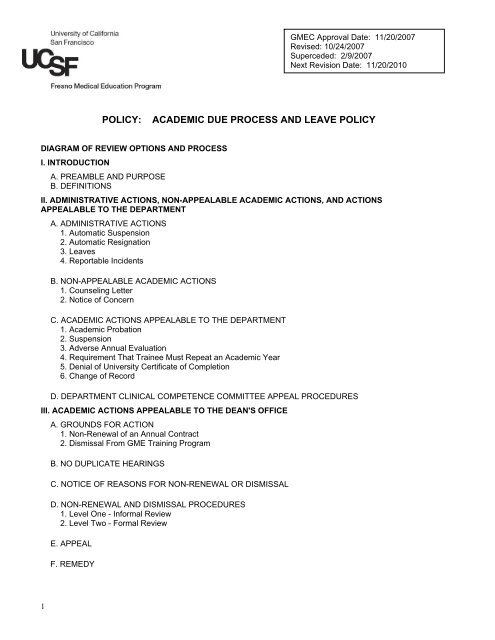
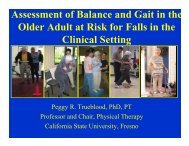
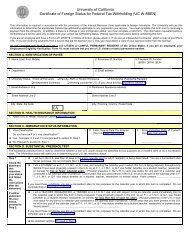
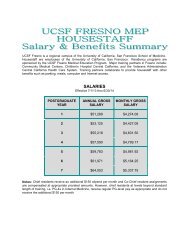
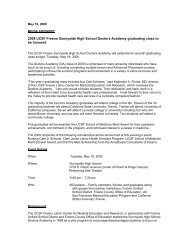
![Assistive Mobility Devices For Prevention Of Falls[1] - UCSF Fresno](https://img.yumpu.com/48127846/1/190x245/assistive-mobility-devices-for-prevention-of-falls1-ucsf-fresno.jpg?quality=85)

